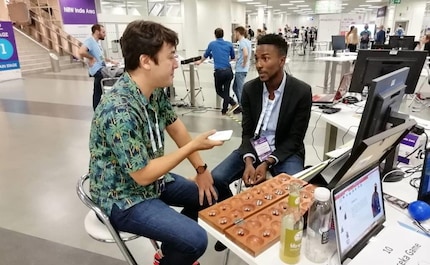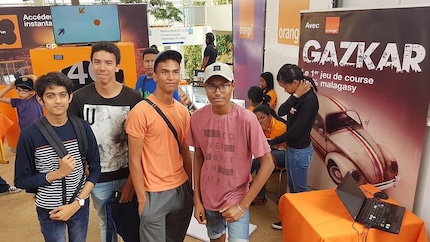
Games made in Africa: «Central African Republic doesn’t have a geek culture»
What difficulties do African game developers face, is there a geek culture and why is «Uncharted 4» one of the most popular games in Madagascar? To find out more, I spoke to three game developers from the African continent.
If I had to name one game that exudes African flair, it would be «Far Cry 2». Even though the malaria jabs, (mainly self-inflicted) bush fires and raw diamonds are a breath of fresh air in terms of gaming environments, it manages to convey virtually no African culture. This is hardly surprising, seeing that the game was exclusively developed by Ubisoft Montreal.
With significantly smaller budgets but tons of home-grown solutions, five African studios presented their games at this year’s Gamescom.
The «Africa Corner» was organised by Paradise Games – one of if not the leading game company in West Africa. Founder and CEO Sidick Bakayoko stated his clear objective in a press release: «Our dream is to have video games as one of the main drivers of the African economy, and as a way to employ millions of people throughout the continent. In order to get there, we need a strong ecosystem with game developers from Africa who export their games in the world and gain publicity internationally.». In view of the fact that 500 million Africans own a mobile phone, it’s not surprising that most developers are focussing on mobile games.
On a cultural mission for Central African Republic

Source: zVg
And Teddy Kossoko is no exception. With Masseka Game Studio, he developed the «Kissoro Tribal Game» for Android and iOS. His game looked familiar to me as soon as I set eyes on it. A quick peek in my board game cabinet confirmed my suspicion: I own a physical version of the same game. I ask him if the game is popular in Central African Republic. He waves dismissively: «Most people think it’s old-fashioned». Teddy further explains that many don’t understand that the game is less about luck and more about mathematics. And this is precisely what Teddy’s trying to convey to people on his travels. He advertises his game either on Facebook or by hanging up flyers in his village.
I also want to know what other games are hot in Central African Republic. «Fifa and PES. Football is almighty,» Teddy says. But he does point out that there’s no real geek culture. No festivals, no fairs, no cosplay etc. «Video games still have a pretty bad public rep,» he explains. A state he’s now trying to change. For example with «Kissoro» – a game with a strong emphasis on African culture. It’s not an easy task he’s set himself. He tells me that the gaming scene back home hasn’t changed at all in the last few years. Now, he’s striving to bring the game standard to the next level. That’s why he’s also involved in a project aiming to create a space where these activities can be structured.
No visa for Madagascar

Matthieu Rabehaja and his team from Madagascar have even greater obstacles to overcome than Teddy does. Their visas were denied so they never made it to Cologne and Gamescom to promote their game in the first place. What's more, just as Central African Republic, the developer scene of this island state is particularly dependent on these types of events. The hurdles to develop games are still relatively high in Madagascar. So it comes as no surprise that only very few people choose this it as their profession. «Many of them are indie developers as the market is still totally underdeveloped,» Matthieu says.
This also includes Mathieu and his Lomay studio, who have been working on the racing game «Gazkar» for a few years now. Since 2012, smartphone sales have exploded thanks to cheap devices from China; and that’s when Lomay started to develop «Gazkar» for Android. The game lets you race around Madagascar in cars that are typical for the country – including the antique Citroen 2CV or the Renault 4L. Even though his studio is developing a mobile game, Matthieu prefers PCs. «The PC is my weapon of choice because it’s the most versatile and allows me to do more DIY on it than a console does.» However, he does make an exception for adventurer Nathan Drake, and he’s not alone. «One of the most popular games in Madagascar is «Uncharted 4». Even people who weren’t into games before think it’s cool to see their country serve as a backdrop for a blockbuster game by Sony.»
Another reason why nobody’s developing for PC or console is that the average monthly income in Madagascar is 70 dollars. «A game for 40 dollars is unaffordable for 80 per cent of the population. Commercialising 60-dollar games like Tomb Raider would be impossible.» That’s why piracy is still very common.
The gaming culture in this former French colony is huge, Matthieu explains. In 2017 and 2018, the capital Antananarivo hosted Tana Games Week. The games fair drew 7,000 visitors and featured cosplay and everything else that goes with it.
Algerian anime aficionados
Fortunately, Frontfire from Algeria were met with fewer problems entering the country. This could have to do with the fact that half of their team are French. Alexandra Vialard is a mix: She grew up in Algeria and emigrated to the South of France as a kid. France is where she turned into a game geek.
Now she wants to cater for other geeks with her beat-‘em-up game «Onizumu». The colourful design, fast fights and smooth animation already make this game a real eyecatcher. «I'm a huge fan of anime such as Dragon Ball, Naruto etc. With Onizumu, I wanted to pay my dues for everything I loved so much as a kid.»
While France has a thriving game culture, Algeria is only just starting to see the potential, Alexandra explains. She adds that, meanwhile, there’s even a school that teaches animation and CG. «There’s a lot of talent in Algeria but we’re dependent on the support of publishers and investors.» Funding is always a major issue in the game industry and hits African states even harder. «We count on initiatives such as Paradise Games that help advertise the Algerian developer scene,» says Alexandra.
I’m fairly confident that Gamescom turned a few visitors into fans of games made in Africa. After all, it’s a big plus for all of us to have fresh cultural influences to enrich our games. I for one would not be opposed to seeing «Far Cry 6» set in Africa once again – a bit more depth would be nice, though.
As a child, I wasn't allowed to have any consoles. It was only with the arrival of the family's 486 PC that the magical world of gaming opened up to me. Today, I'm overcompensating accordingly. Only a lack of time and money prevents me from trying out every game there is and decorating my shelf with rare retro consoles.
Interesting facts about products, behind-the-scenes looks at manufacturers and deep-dives on interesting people.
Show all